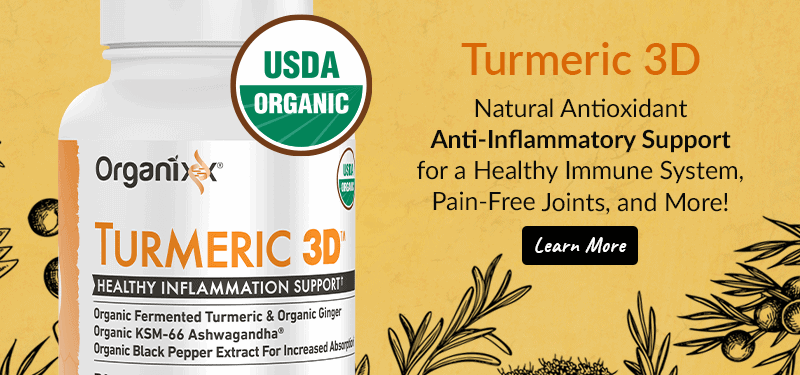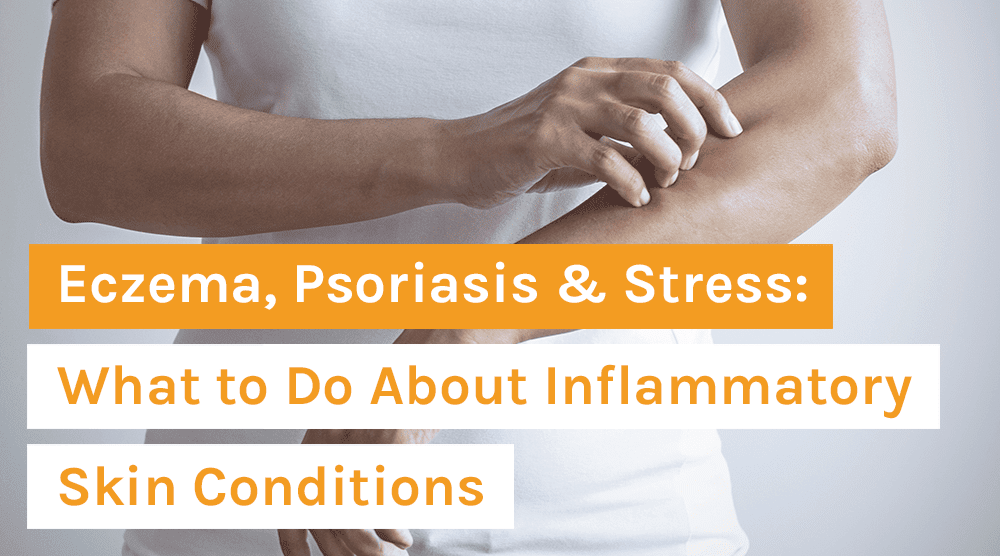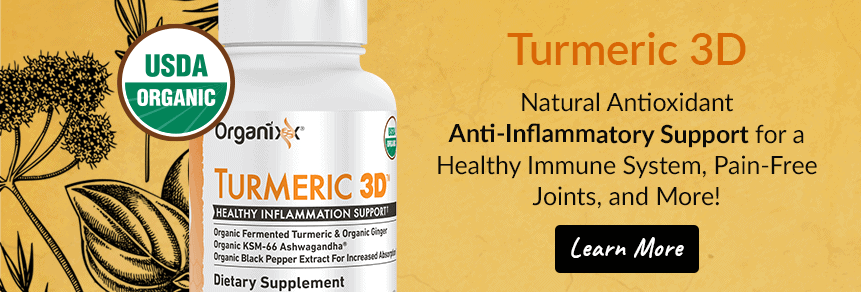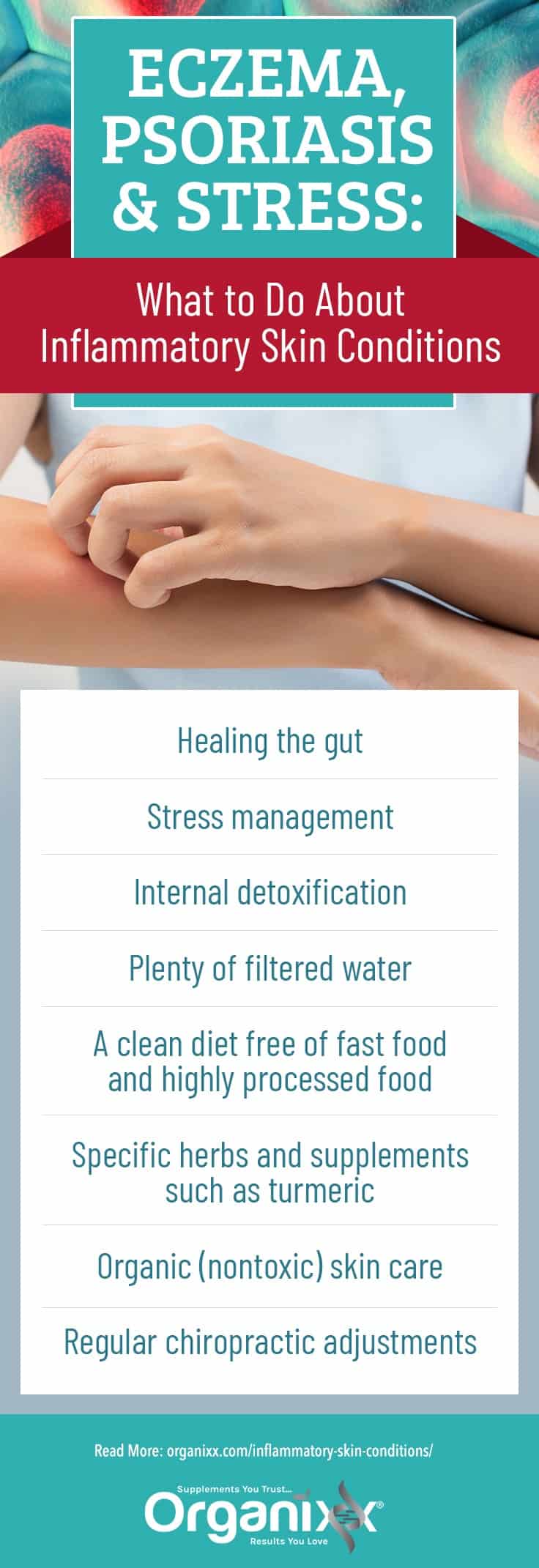Eczema, Psoriasis & Stress: What to Do About Inflammatory Skin Conditions
In a hurry? Click here to read the Article Summary...
If you have an inflammatory skin condition such as eczema or psoriasis, you have undoubtedly noticed that it gets worse when you are stressed. High levels of cortisol (the hormone that is released in abundance when you are under stress), can worsen inflammatory skin conditions.
But there’s more to it than that. Stress makes skin more sensitive and reactive, and it can slow the healing process. However, new research is shedding light on how stress and inflammatory skin conditions are interconnected.
It all begins in the human embryo, as the brain and the skin both originate from the same embryonic tissue. Both brain and skin are also under the influence of the same hormones and neurotransmitters. Therefore it is easy to see why stress can influence both organs [1].
Psoriasis and Eczema: What’s the Difference?
To the untrained eye, psoriasis and eczema can appear to be similar. But psoriasis is considered to be a less common auto-immune disease, while eczema (also known as atopic dermatitis) is a more common inflammatory skin condition.
Psoriasis is a chronic, inflammatory, non-contagious skin disease that affects approximately one to two percent of the global population. Psoriasis typically hits those between the ages of 15 and 35, according to the U.S. National Library of Medicine, but it can affect people at any age. It generally begins as a small sore on the body that does not heal, but worsens and begins to spread.
Symptoms of psoriasis include silvery white patches of dead skin cells that can also be scaly, red, dry, thickened, painful, and very itchy. Those with psoriasis are likely to experience differing levels of severity throughout their lifetime, if not treated, and it is common for the condition to spontaneously flare up and subside [1].
Eczema is a non-contagious, inflammatory skin condition, estimated to affect between 18 to 30% of the world population. It can strike at any age and symptoms include reddened, dry, itchy, scaly skin. In severe cases, the skin may weep, bleed, and crust over, and sometimes become infected.
Like psoriasis sufferers, spontaneous flare-ups and remissions of eczema can frequently occur over a person’s lifetime, if not well managed.
The Research on Psoriasis, Eczema, and Stress
While eczema and psoriasis are believed by the medical community not to be brought on by stress, both dermatologists and those with eczema and psoriasis will certainly tell you that stress makes the condition worse.
Researchers recently reviewed past studies on the role of psychological stress in the exacerbation of psoriasis, hives, eczema, herpes virus infections, and other skin conditions.
The authors of the study concluded that there is ample evidence linking psychological stress to the aggravation of these skin conditions [2].
The study discussed the fact that over 1,200 years ago Persian physicians used “exploratory psychotherapy” with their patients who suffered from stress and had psoriatic flare-ups. So even the ancient Persians knew there was a mind-body connection!
These modern-day researchers also noted that when compared to patients with some other skin diseases, people with psoriasis were more likely to report stressors preceding the onset of their disease, suggesting that psoriasis might be more stress-related than other skin diseases.
The Role of Stress on Eczema
Eczema (aka atopic dermatitis) also appears to be related to stress. In a 2018 study from the Department of Dermatology, Northwestern University Feinberg School of Medicine in Chicago, it was found that American children from families with single adults, single mothers, non-biological fathers, or unmarried mothers may have an increased risk of atopic dermatitis. These children were more likely to have poorer overall health, depression, anxiety, and stress [3].
Interestingly, there seems also to be a potential correlation between the experience of stress by mothers-to-be and the risk of their child developing eczema. A 2018 study investigating maternal stress during pregnancy and the risk of eczema in the child found a strong correlation. Study authors stated:
“The findings highlight the importance of the implementation of stress reduction programs for pregnant women and those in their postpartum period within communities to enable these individuals to relieve stress effectively [4].”
Many studies also illustrate the role of stress in psoriasis. One such study, reported by Malaysian researchers in 2018, found that 48% of Malaysian psoriasis patients were triggered by stress [5].
French researchers recently found that in 31%-88% of psoriasis cases, patients reported stress as being a trigger for their condition. Not surprisingly, they also discussed the fact that stress was also a consequence of psoriasis outbreaks, as the constant itching of psoriasis can be extremely troublesome.
The study authors stated that it was important to target stress when proposing treatment to patients with psoriasis. They listed several controlled studies which demonstrated that relaxation, biofeedback, hypnosis, and cognitive stress management therapies were found to be effective interventions [6].
A 2018 Danish study in patients with psoriasis found that 25% of patients with psoriasis had problems with insomnia. In their case-controlled study, 53.9% of patients with psoriasis were poor sleepers, and the main reason for that was incessant itching [7].
The Biochemical Aspect of Stress and Inflammatory Skin Conditions
The researchers at Northwestern University Feinberg School of Medicine in Chicago mentioned earlier stated that although there is a well-known association between psychosocial stress and psoriasis, the underlying mechanism was, until recently, poorly understood.
In the past, the majority of evidence investigated alterations of the endocrine and peripheral nervous systems, but less was known about the role of the immune system in psoriasis [8].
A recent increase in studies investigating the role of the immune system in stress and inflammatory skin conditions have resulted in some interesting findings. Several studies found that when the body is under stress, leukocytes (white blood cells, part of the immune system) migrate to the skin, pro-inflammatory cytokines get involved in the process, together with a reduction in anti-inflammatory cytokines.
The Development of Psoriasis
Indeed, Chinese researchers recently released a study on the pathogenesis of psoriasis. [Note: the pathogenesis is the manner in which a disease develops]. They found that increased oxidative stress and abnormalities in T-cells were involved in the onset of psoriasis.
The resulting reactive oxygen species induced proliferation (rapid cell growth) and differentiation (the process where a cell changes from one cell type to another) of specific T-cells and inhibited the anti-inflammatory activities of regulatory T-cells.
Inflammatory cytokines also stimulate the proliferation of keratinocytes (the predominant cell type in the outer layer of the skin) and angiogenesis (the formation of new blood vessels).
These researchers also found that a certain class of phytochemicals known as proanthocyanidins, found in many fruits and berries, reduced the oxidative stress and eased the inflammatory process [9].
Natural Therapies for Eczema and Psoriasis
Many holistic doctors and naturopaths will agree that healing the gut is the first place to begin when addressing eczema and psoriasis. The stress aspect must be dealt with, but a good holistic program for healing psoriasis and eczema will generally include:
- Healing the gut
- Stress management
- Internal detoxification
- Plenty of filtered water
- A clean diet free of fast food and highly processed food
- Specific herbs and supplements such as turmeric
- Organic (nontoxic) skin care
- Regular chiropractic adjustments
As with any health issue, the more proactive the patient is, the better the result. Work with a naturopath or other holistic health practitioner to find out if and how the above steps should be applied to help you heal your inflammatory skin condition.
USDA Certified Organic Turmeric 3D from Organixx is a synergistic blend of organic and patented ingredients, including naturally fermented FermaPro® Organic Turmeric Root, along with Organic KSM-66® Ashwagandha, Organic Ginger Root, and Organic Black Pepper Fruit Extract (10%) Piperine. Each ingredient is clinically studied to support inflammation, stress, immune health, and metabolic balance, and optimized with a bioavailable delivery system that boosts absorption by 2,000%.*
*These statements have not been evaluated by the Food and Drug Administration. This product is not intended to diagnose, treat, cure or prevent any disease.

 Sources:
Sources:
Article Summary
Eczema is a non-contagious, inflammatory skin condition, estimated to affect between 18 to 30% of the world population.
Psoriasis is a chronic, inflammatory, non-contagious skin disease that affects approximately one to two percent of the global population.
High levels of cortisol (the hormone that is released in abundance when you are under stress), can worsen inflammatory skin conditions.
Stress makes skin more sensitive and reactive, and it can slow the healing process.
Natural Therapies for Eczema and Psoriasis
- Healing the gut
- Stress management
- Internal detoxification
- Plenty of filtered water
- A clean diet free of fast food and highly processed food
- Specific herbs and supplements
- Organic (nontoxic) skin care
- Regular chiropractic adjustments






I never knew that a chiropractic adjustment could do so much.
I would also like to know what LDN is please?
low dose naltrexone is LDN. You can google to learn more
Interesting that you included Chiropracatic with the various treatment options. Would you be able to explain why? Thanks,
Mike
Hi Michael. Some chiropractic doctors believe that a malfunctioning nervous system causes a person's organ (e.g. our skin) to lose its proper nerve supply and can result in skin problems such as eczema and psoriasis.
I began low dose naltrexone for something else and out of the blue, I found my long standing psoriasis was gone. I researched and found it made perfect sense. LDN works systemically - it normalizes the immune system. I am so over the moon delighted psoriasis is gone and LDN did it... I have always exercised and eaten healthy (been a healthy greens eating vegetarian for years and do no meds) so it wasn't that. I do know my psoriasis was brought on by stress. But LDN took it away. And it gives me deep sleep and it undid some of the things age took away - regrew thinning pubic hair. I wasn't expecting that marker of youth.
I was delighted to read your comments. 12 years ago i took LDN for soriatic arthritis & the next day i was pain free. A miracle. After several months i could no longer get prescriptions & tried making my own with tablets & water. No good. I've just had my first knee replacement & must have the second in a few months plus major surgery on hand & foot. I was recently given private prescriptions by a doctor friend but i fear it's now too late. I refused Methotrexate which suppresses the immune system in favour of LDN which normalises it. Carry on taking it for life. A wonder drug but far too cheap to interest the pharmaceuticals!
What is LDN? I've read it in this line of comments a few times, but have no clue what it is.
Could you clarify please? First you say you took naltrexone (??) and then you say you took LDN and I have no idea what either of these is.
Thank you if you happen to see this and can respond.
What is LDN please.... thanks
Thank you for sharing your story with us, Ann.
Article Summary ~ Natural Therapies for Eczema and Psoriasis
I think you forgot one, being regular exercise?
I find this one of the key ways to manage stress in my own life as a busy professional.
Thank you for sharing, David!